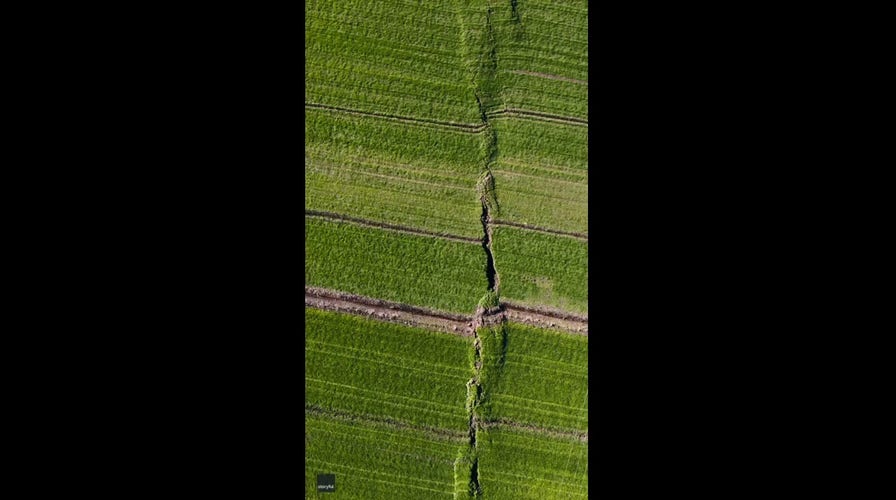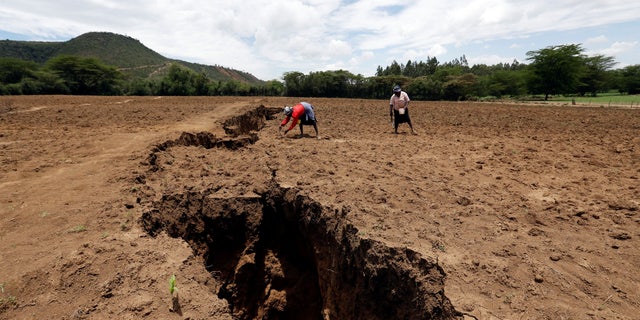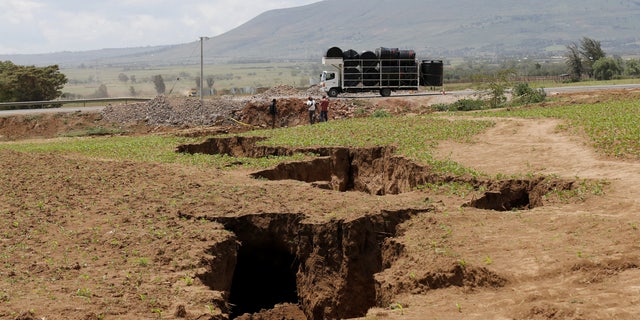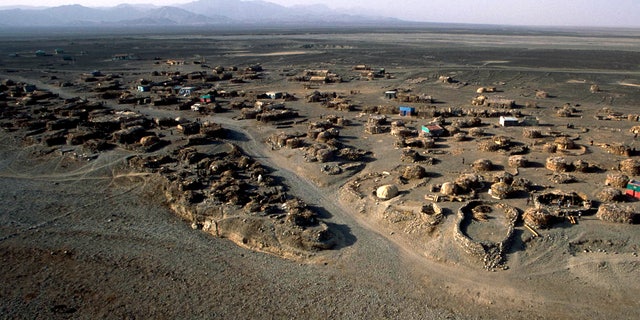close 
Surface ruptures along a fault line two days after deadly earthquakes
Drone footage shows a surface rupture in Kahramanmaras, Turkey, just two days after deadly earthquakes hit the area. See the aerial footage of the damage in this video.
A new ocean could form in the distant future after a split continues to form in Africa, according to researchers.
“This is the only place on Earth where you can study how a continental rift becomes an oceanic rift,” Christopher Moore, a doctoral student at the University of Leeds, told The Economic Times.
“We can see that oceanic crust is starting to form because it’s distinctly different from continental crust in its composition and density,” Moore said.
The split formed in the desert of Ethiopia, creating the possibility that countries such as Kenya and Uganda could develop a coastline as a new ocean forms in the crevice.
POTENTIALLY DEADLY, DRUG-RESISTANT FUNGUS SPREADING RAPIDLY IN US

Women work on their farm near a chasm suspected to have been caused by a heavy downpour along an underground fault line near the Rift Valley town of Mai Mahiu, Kenya, March 28, 2018. (Reuters/Thomas Mukoya)
The 35-mile-long split, known as the East African Rift, formed in 2005, but any development into a new ocean will take around five to 10 million years, researchers said.
“The Gulf of Aden and the Red Sea will flood in over the Afar region and into the East African Rift Valley and become a new ocean, and that part of East Africa will become its own separate small continent,” Ken Macdonald, a marine geophysicist and a professor emeritus at the University of California, told Mashable.
HUBBLE TEAM RELEASES DAZZLING NEW IMAGES OF STAR-STUDDED CLUSTERS

A truck drives close to a chasm near the Rift Valley town of Mai Mahiu, Kenya, March 28, 2018. (Reuters/Thomas Mukoya)
“As we get more and more measurements for GPS, we can get a much greater sense of what’s going on.”
The cause of the split remains unknown, but some believe the formation of the rift was driven by tectonic processes similar to those occurring at the bottom of the ocean, according to the Times.
ASTEROID TO FLY BETWEEN EARTH AND THE MOON THIS WEEK: REPORT

GAh Medella, one of the main villages in Afar depression near the Eritrean border, December 2005. (Reuters/Michel Laplace Toulouse/Files )
The rift sits at the border of three tectonic plates that have been drifting apart for some time. The plates – identified as the Somalian tectonic plate, the Nubian tectonic plate and the Arabian tectonic plate – drift farther apart by a few millimeters per year, The Jerusalem Post reported.
Cynthia Ebinger, a geophysicist at Tulane University in New Orleans, noted that the split has developed in an area with some of the highest temperatures on the planet.
“The hottest inhabited town on the Earth’s surface is in the Afar,” Ebinger told NBC News. “Daytime temperatures often go to 130 degrees Fahrenheit and they cool off to a balmy 95 degrees at night.”
CLICK HERE TO GET THE FOX NEWS APP
She described how the split initially formed, taking just a few days to do what normally takes “several hundred years” of tectonic plate movement.
“We’re trying to understand the straw that breaks the camel’s back,” she said, speculating that the build-up of pressure from rising magma could trigger the explosive events so far seen in the region.
Peter Aitken is a Fox News Digital reporter with a focus on national and global news.
